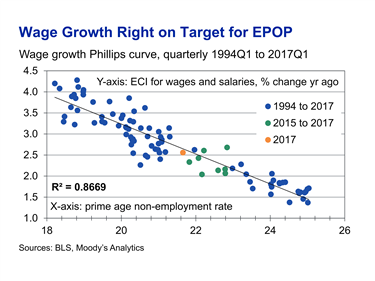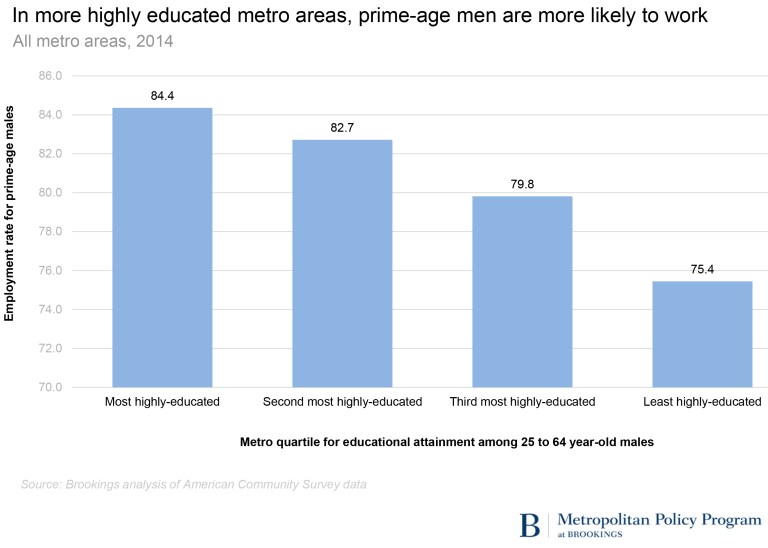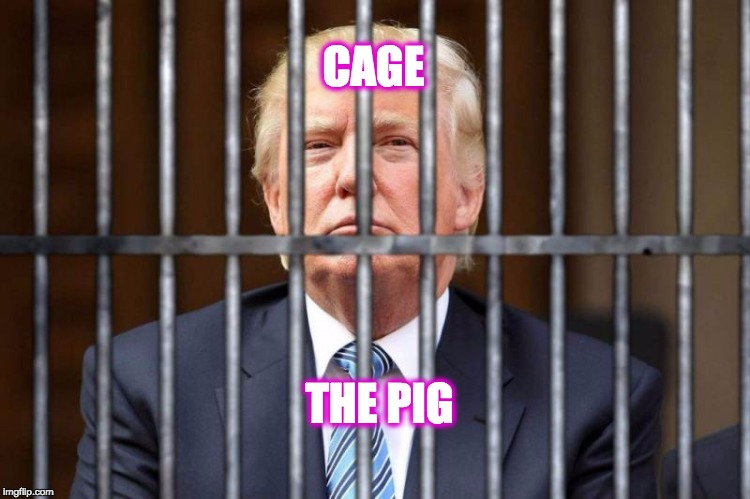eBay Huckster
Member
why are we worrying so much about a Cool Slogan three years out from the 2020 general and two years out from any actual announcements, again
why are we worrying so much about a Cool Slogan three years out from the 2020 general, again
Because Congressional Dems need something to run on next year
This would indicate that part of the story here is that the people not looking for jobs at the bottom of the labor market are part of the story w/ why wages haven't been rising as much as we'd assume even while accounting for the wage/productivity decoupling.Using Unemployment

Using Prime Age Non-Participation Rate

According to data from the Census Bureau's
American Community Survey, in 2014, 81 percent of prime-age men nationwide were employed (this statistic differs from the labor force participation rate in that it omits those who are looking for, but not in, work). Yet among the nation's 374 metropolitan areas for which data are available, that rate ranged from over 93 percent in the oil boomtown of Midland, TX, to just over 50 percent in Kings County in California's Central Valley.
There are clear regional patterns to this important statistic. Many of the metro areas with the highest employment rates for prime-age men are smaller places located in the middle of the country, from the Upper Midwest, to energy-rich areas in Texas and the Plains states, to the Intermountain West. In several large, economically dynamic metro areas such as Denver, Houston, Minneapolis, San Jose, and Washington, D.C., rates of work among prime-age men are also very high.
Of much greater concern is the large number of metropolitan regions with very low rates of work among prime-age men. These include many small former industrial centers in states like Michigan, Indiana, and Ohio; areas of West Virginia and Louisiana that rely on declining-employment industries like mining; and long-struggling agricultural economies in Arkansas, Texas, and inland California.
These patterns echo findings from the CEA report that falling demand for labor is an important part of the long-term decline in prime-age male employment. In many places where a high school diploma alone once provided the gateway to a middle-class job, nearly one-third of men in this age group are out of work. This is also evident in the local relationship between educational attainment and work—where educational attainment rates are higher among prime-age men, members of that group are more likely to be employed. A 10-percentage point difference in employment rates separates the most highly-educated quarter of metro areas from the least highly-educated quarter.
Beyond education, size seems to matter, too. Large metro areas exhibit higher rates of work among prime-age men than small metro areas. Across the 100 largest U.S. metro areas, 83.2 percent of prime-age males are employed, compared to 79.8 percent in the smaller 274 metro areas. This relationship partly reflects that men in large metro areas have higher rates of educational attainment than those in small metro areas. Yet even men who have no more than a high-school diploma work at higher rates in large metro areas (64 percent) than similarly educated men in smaller metro areas (62 percent). Larger regional economies with greater economic diversity may stimulate stronger demand for workers at lower skill levels.
Several of the policies that the CEA report recommends to improve prime-age male labor force participation, such as bolstering investment in public infrastructure, reforming unemployment insurance, and boosting educational attainment could help boost rates of work in lagging U.S. metro areas. However, none directly addresses the fact that problems in male employment disproportionately affect small and often economically isolated U.S. regions. This evidence suggests that policies to help dislocated workers relocate to larger, more economically dynamic metro areas—particularly by
improving the supply of affordable housing in those regions—should be part of a comprehensive strategy to help reverse the troubling long-term decline in men's work.

The problem for Dems and polticians in general: People. Hate. Change.
did the GOP need anything to run on in 2010 or 2014 beyond "kill the bill" and "Ebola Isis is coming to kill us all"
did the GOP need anything to run on in 2010 or 2014 beyond "kill the bill" and "Ebola Isis is coming to kill us all"
and for that matter, what did the democrats in 2006 even run on?
"Culture of corruption" was a big and highly successful one.
It's hard to an attack a candidate's record when they don't have one. (and people are very bad at inferring the correct things about their personal character.)I would argue that the base of the GOP and the base of the Democrats are fundamentally different. We've already seen that "Trump is bad" doesn't work
Watching some 1992 election coverage and it's funny to see Ann Richards say this given where the Democratic Party is today https://youtu.be/63Al95TrlO0?t=1h50m6s
Wait...
Canova is hinting he might try to primary Nelson?
Please proceed, Tim.
Wait...
Canova is hinting he might try to primary Nelson?
Please proceed, Tim.
God bless Tim, I find him utterly amusing and useful as a example of why just going all in on primarying someone without paying attention is stupid.
Im not sure how strong Nelson will be in the general election this time around, and a number of folks trying to convince me to run think Rick Scott will have his way with Bill Nelson.
Don't worry guys. Crackpot Tim is on the case to save us from Voldemort.
"Electing Tim will send a strong message to the Democratic establishment about what this party should stand for."
”I have no idea about Tim Canova, I honestly don't," Sanders said when asked if he plans to support Canova's second bid against Wasserman Schultz. ”I know nothing about Tim Canova."
I know, but that's making your slogan too abstract. If you have to explain the walls are metaphors for economic injustice, your 50-something surburban dude that Obama carried and Clinton lost already just writes you off as an airy-fairy liberal arts students.
These are like slogans the Trump team came up with before settling on MAGA.I'm fairly certain walls are pretty cogent even for white dudes with a high school education.
Other concepts:
"The America We Deserve"
"Get America Working"
"Take Back the Future"
"Everyone Counts"
This is a fascinating topic to me precisely because I don't really think we have a socioeconomic framework that has consistent answers to issues like this yet. As technology advances and culture shifts certain forms of labor become, well, less actually useful to people, and we don't want to artificially inflate labor that's not actually useful, and that's true regardless of who owns said labor. You can subsidize housing and even directly subsidize people moving to where their labor will be useful again like suggested here but a lot of people don't want to move from where their family has lived for 80 years and I don't think that's...unreasonable? At the very least I don't think "tough luck" is quite a satisfactory answer to themNot specific to the Wage/Productivity decoupling- just wages in general along w/ the economy and related politics of it, but there's stuff going on with the male labor force participation rates that is worth considering.
Blog post that came up in my timeline today that found that Prima Age Non-Participation Rate is a better fit for patterns of wage growth than Unemployment Rate. https://www.economy.com/dismal/anal...al&utm_source=twitter.com&utm_campaign=buffer
This would indicate that part of the story here is that the people not looking for jobs at the bottom of the labor market are part of the story w/ why wages haven't been rising as much as we'd assume even while accounting for the wage/productivity decoupling.
We have indeed been seeing a decline in the male Labor Participation rate. However, it is heavily gendered w/ only older women seeing any recent downward trend, and in the '80s & 90s, disguised by a mass influx of women into the labor market.
In addition, we're seeing very large differences in participations rate depending on the composition of the local economy: https://www.brookings.edu/blog/the-avenue/2016/06/21/where-are-the-nonworking-prime-age-men/
That last part is important because these patterns that we're seeing w/ people movement aren't going to reverse themselves. http://overflow.solutions/demographic-data/population-change-in-each-u-s-county-from-2015-to-2016/
We're not just seeing massive gaps occur for urban v rural, we're seeing gaps in urban areas as well, where better-educated and/or larger areas have massive advantages over lesser-educated an/or smaller ones. There appear to be advantages to scale here that are effectively causing a mass amount of gravitational pull to draw people into these more-successful areas that has a snowball effect.
Plan to defeat ISIS delivered in 30 days or your pizza is free!How about "Republicans Try, Democrats Deliver"?
Or does it make people think of delivery pizza?
Watching some 1992 election coverage and it's funny to see Ann Richards say this given where the Democratic Party is today https://youtu.be/63Al95TrlO0?t=1h50m6s
*holding pen*What was Bob Dole's campaign slogan? Paging benji.
What was Bob Dole's campaign slogan? Paging benji.
John Santucci @JTSantucci
Sources tell ABC News that Mark Corallo, spokesperson for Trump legal team working Russia probe had resigned. No word yet from Corallo.

According to WaPo. Trump's lawyers are researching the limits of presidential pardoning power. Uh oh.
This is AMAZING. Lol
Legit remember him directing people to his website ("dubya dubya dubya...") like he barely knew what he was saying.
Maybe if Unemployed Man can make a good enough slogan he can get employed again.
These are like slogans the Trump team came up with before settling on MAGA.
"Lock him up"
Young Web is my favorite rapper.Man it feels so weird visiting sites from the Young Net.
